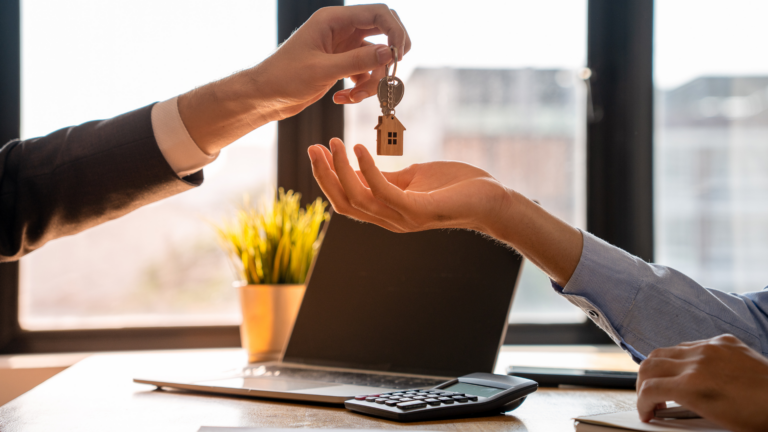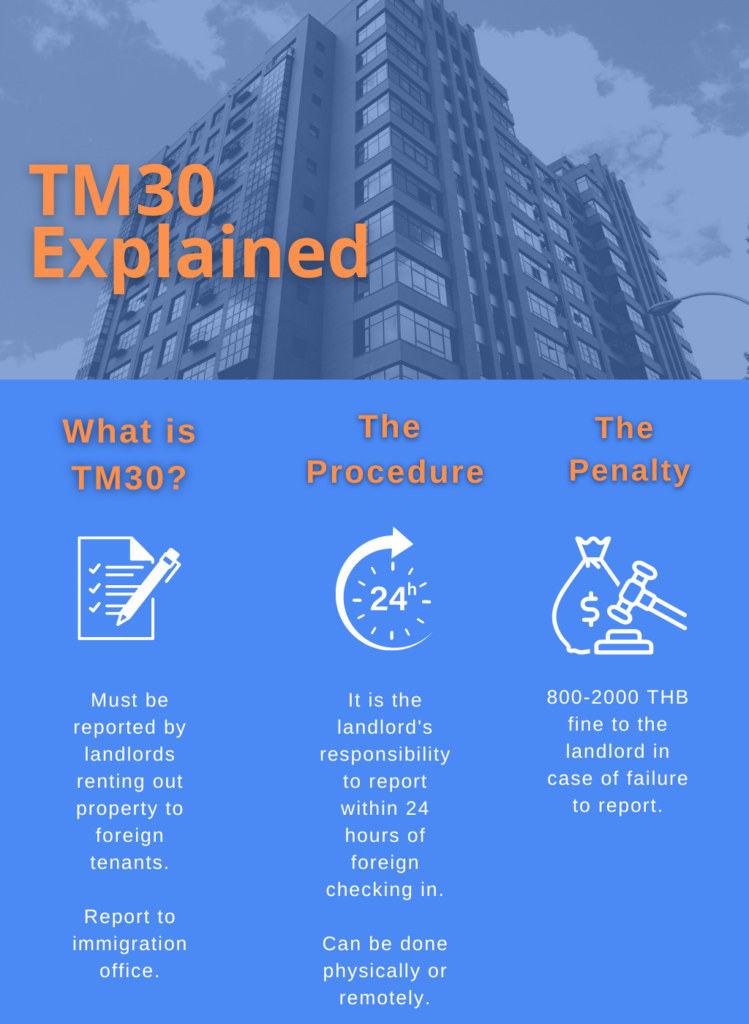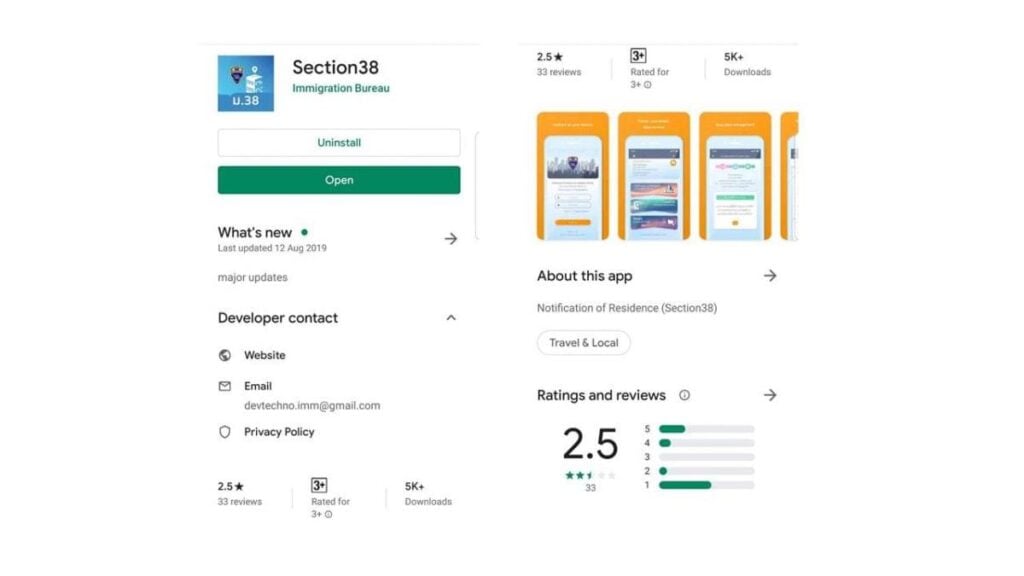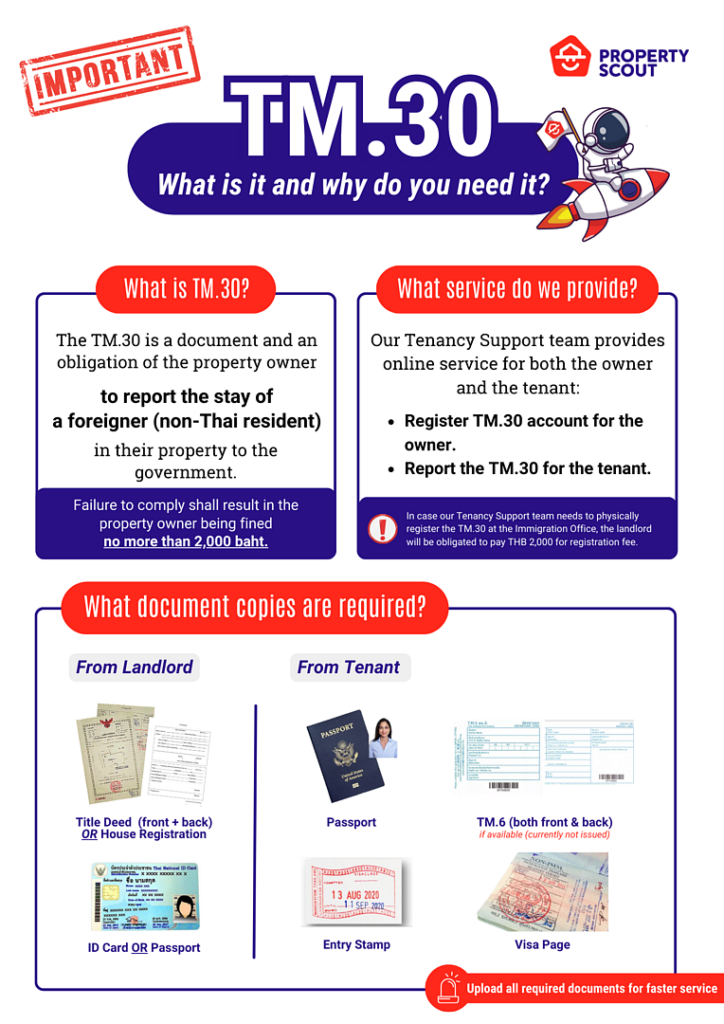TM30: All there is to know about Registration for Landlords & Foreign Tenants


"Will I be affected by this regulation?" "What if I don't make it? How will I be penalized?"

For 3 months, the public's reception towards the enforcement of the TM30 report in Thailand has ranged from mere confusion to utter rage and panic altogether and it's easy to see why, as most foreigners and landlords find it awfully convoluted. This panicked outrage has caused various stakeholders to call for the cancellation of such enforcement to no avail, as current status on whether the law would stay or it would go remains in question indefinitely. Fear no more as this article will slowly but surely help guide you through the necessary requirements and regulations to note regarding the TM30 report.
What is the TM30 Report?
The TM30 Report is a notification from the landlord as to where the foreigner has stayed and was established as far back as 40 years ago. Essentially, the TM30 allows the Thai government to know where each foreigner is staying. As stated in Section 38 of the 1979 Immigration Act,
"Landlords and leaseholders that receive a non-immigrant resident on their premises, have a legal obligation to report that individual to Thai immigration; this report needs to be completed within a 24-hour period of the non-immigrant resident’s arrival."
In short, landlords who rent out properties to foreign tenants are responsible for reporting that individual's attendance to an immigration office within 24 hours of the foreign tenant checking in, meaning landlords have only this much time to file the report accordingly. Failure to comply with reporting and submitting the TM30 report accordingly will result in some consequences, which will be detailed shortly.
What are my TM30 duties and responsibilities as a landlord?
Landlords renting out their properties to foreign tenants staying overnight are held liable for the proper completion and submission of the report, with the TM30 report applying to all foreigners staying in Thailand, including those with Non-Immigrant B Visas, Retirement Visas, Student Visas, and Spouse Visas. On the contrary, foreign tenants are not held liable for filing the report, meaning they are not required to fill in and submit the report.
How will I be penalized if I can't file a TM30 report?
Landlords who fail to file the TM30 report regarding the attendance of a foreign tenant in their rented out property will face a fine of 800-2000 Baht. Due to the considerably minor consequences, landlords may fall ignorant of the procedure, However, this could potentially impact the tenant's Thailand residency status and future Visa applications. Certain sources have reported that Thai immigration officials are requesting for the approval of TM30 reports in order to process Visa renewals, however this practice and its enforcement has yet to be confirmed. In the meantime, just make sure to file the report in time.
Could the TM30 regulations be cancelled?
In the past few months since the abrupt enforcement of the TM30 regulations, there has been considerable pressure from various stakeholders (particularly foreign business and trade association) on the Thai government calling for cancellation of the TM30 regulations. Prominent organizations such as the Joint Foreign Chambers of Commerce in Thailand as well as the European Association for Business & Commerce (EABC) have considered the regulation as undermining the foreign business. With the proposal of current regulations from both organizations, this pressure has helped ease the difficulty of the situation in Thailand for foreigners, raising awareness of various challenges it creates for foreigners and Thai landlords alike.
TM6 Cancellation
For travelers coming to Thailand by air, the TM6 arrival/departure card has been cancelled as of July 1st, 2022.
For those who arrive in Thailand on or before the TM6 cancellation date and given a TM6 card upon arrival, a TM6 number will still be required upon registration for the TM30 report whether it's online or through the Section 38 application. Moreover, keeping your TM6 card with you at all times is strongly recommended.
Otherwise, those who arrive in Thailand following the TM6 cancellation date and did not receive the TM6 card can leave the TM6 number section blank in the TM30 application.
Click submit once all the necessary information and documents such as photos are uploaded.

TM30 Registration through paperwork
Documents required from landlords or representatives
The following are the documents required from landlords or the landlord's representatives for the TM30 registration:
- Completed TM30 report
- Copy of the landlord's ID/Passport
- Copy of a household registration book (ทะเบียนบ้าน) or title deed (โฉนด)
- Copy of rental agreement or land sale contract (in case of long lease)

Documents required from leaseholders
The following are the documents required from leaseholders:
- Copy of the foreign leaseholder's passport (Photo & information page, Visa page, Arrival stamp page)
- Copy of a departure card (TM6)
Keep in mind that all documents must only be certified using blue ink.
Submission of documents
The aforementioned documents can be submitted as follows:
Either:
- Submitting documents to relevant immigration office (application must include return envelope to receive stamped notification of stay receipt and it can take up to 2-4 weeks to be processed).
- Or visiting the immigration office PHYSICALLY, which is the most direct way to receive confirmation.
Due to the immediate enforcement of the TM30 application, certain enterprising runners and messengers also offer an informal registration service, to which they will physically attend the immigration office and submit the documents for a fee of 500 to 1000 Baht (not including late application fines).

TM30 Registration using the immigration app
While the physical submission of paperwork is possible for a TM30 registration, it is recommended that you register using the immigration app (which is available for both IOS and Android) or website, thanks to its increased speed and convenience. For non-Thai-speaking landlords, though, using the app is advised for the English version of the application process.


Once the app has been successfully downloaded, the first step is to register the "rental property" into the immigration system, which is relatively simple and requires only basic property and landlord information. Once the registration has been submitted, the landlord should then receive a confirmation email notifying them of their username and password within the hour. Note that the system will require the landlord/user to update their password after their first login.

Once the registration has been completed, landlords should then click on "notification of residence", which will navigate them to another registration screen.
Fill in the following required information:
- Tenant's check-in/out date
- Tenant's personal details (Passport N.O., Name, date of birth, etc.)
- Tenant immigration details (TM6 N.O., date of arrival in Thailand)

The app should then display the result as seen here, which includes tenant's application records, once all steps are completed.

Conclusion
And there you have it, the TM30 registration and all there is to know. We hope you found this article informative regarding the do's and don'ts whether you're a landlord or a foreign tenant yourself whose desire is to rent out a property in Thailand. If you made it all the way to the end of the article here, you will now realize the TM30 registration isn't as big of a convoluted mess the public is making it out to be, you just have to keep in mind of the documents required, make sure the registration is punctual, and you should be good to go!
Got further questions? Contact Us!
Got further questions regarding the TM30 registration, still unclear on certain aspects of the law or required documents? Please get in touch with us, our property consultant team will be very happy to assist you and answer your questions and concerns, don't hesitate to speak up! In the meantime, let us know what you think in the comments below!



